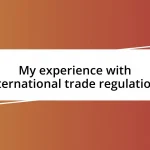Key takeaways:
- Post-Brexit regulatory changes created significant challenges for businesses, including increased tariffs, complex paperwork, and market uncertainty.
- Effective strategies for navigating new regulations include staying informed, seeking expert advice, and fostering collaboration within teams.
- Future regulatory landscapes will likely become more complex, with a focus on sustainability and innovation, presenting both challenges and opportunities for growth.

Understanding post-Brexit changes
The shift in regulations post-Brexit opened my eyes to how interconnected our systems really were. I recall the confusion I felt when the rules changed almost overnight, impacting both my work and daily life. It made me wonder: How often do we take for granted the stability that familiar regulations provide?
In navigating the new landscape, I encountered challenges that felt daunting at first. For instance, when trying to import goods, I had to delve into a whole new set of customs procedures. That experience taught me that staying informed is essential; I realized just how crucial adaptability has become in our ever-evolving regulatory environment.
There are days when I truly miss the simplicity of pre-Brexit regulations. I remember a time when all I had to worry about was the quality of my goods, not a labyrinth of paperwork and compliance checks. It left me contemplating how our choices are now deeply impacted by wider political changes—do we fully grasp the weight of our decisions in this new era?

Challenges faced by businesses
Navigating the post-Brexit landscape brought a slew of unexpected challenges that I certainly wasn’t prepared for. I still vividly remember the stress I felt while trying to decipher the new tariffs on certain imports. My suppliers were just as confused, leading to delays, added costs, and a lot of frustration all around. It’s hard not to feel overwhelmed when you are faced with changing rules that directly affect your bottom line.
One of the toughest hurdles has been the increased paperwork. I can’t tell you how many hours I’ve spent sorting through different forms just to get my products to market. It feels like a constant battle against bureaucracy; every step seems to take twice as long as it used to. It’s not just about getting things done; there’s this nagging worry that I might miss something critical and end up in a tricky situation.
Moreover, the uncertainty in the market has been a significant concern for many business owners, myself included. Fluctuating exchange rates and the potential for sudden regulatory shifts create a level of unpredictability that can stifle growth. I often find myself considering my long-term strategies more carefully now. How do we move forward when the rules seem to change constantly? It’s like playing a game where the goalposts are always shifting.
| Challenge | Impact |
|---|---|
| Increased Tariffs | Higher costs and delays in importing goods |
| Complex Paperwork | More time-consuming processes leading to frustration |
| Market Uncertainty | Difficulty in long-term planning and potential stalling of growth |
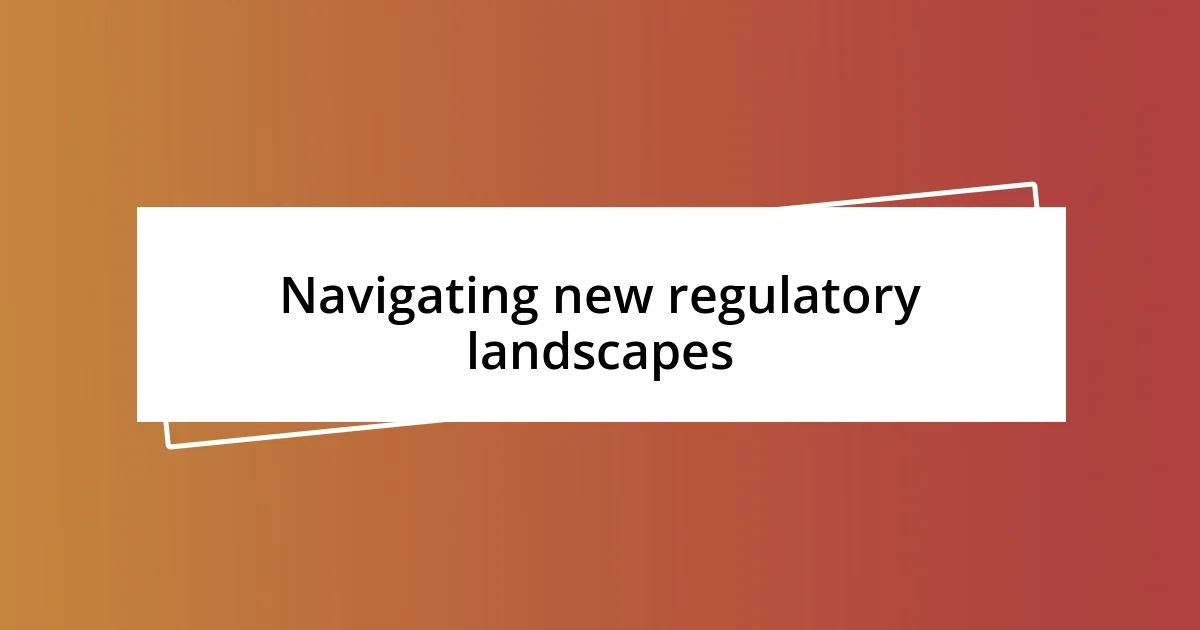
Navigating new regulatory landscapes
Navigating the new regulatory landscape post-Brexit felt like stepping into an entirely different world. I remember the first time I faced a new compliance requirement; it hit me like a brick wall. The rules I had taken for granted were rewritten, and I found myself combing through documentation late into the night. I learned that being proactive was crucial. Understanding regulations isn’t merely about following orders; it’s about anticipating changes and how they might affect your business strategy.
To help manage this new reality, I developed a few strategies that have made a considerable difference:
- Stay Informed: Regularly check government updates and industry newsletters to keep abreast of changes.
- Seek Expert Advice: Don’t hesitate to consult compliance professionals who can provide tailored guidance.
- Network: Engaging with fellow businesses can unveil shared experiences and solutions to common challenges.
The emotional toll of adapting was significant too. There were moments of frustration, particularly when my usual suppliers couldn’t navigate the new rules as quickly as I hoped. It was disheartening to feel like I was starting from scratch in relationships I had built over years. Yet, through this uncertainty, I discovered a resilience I didn’t know I had. Adapting to new regulations may be challenging, but I now appreciate the value of flexibility and continuous learning in a rapidly changing environment.
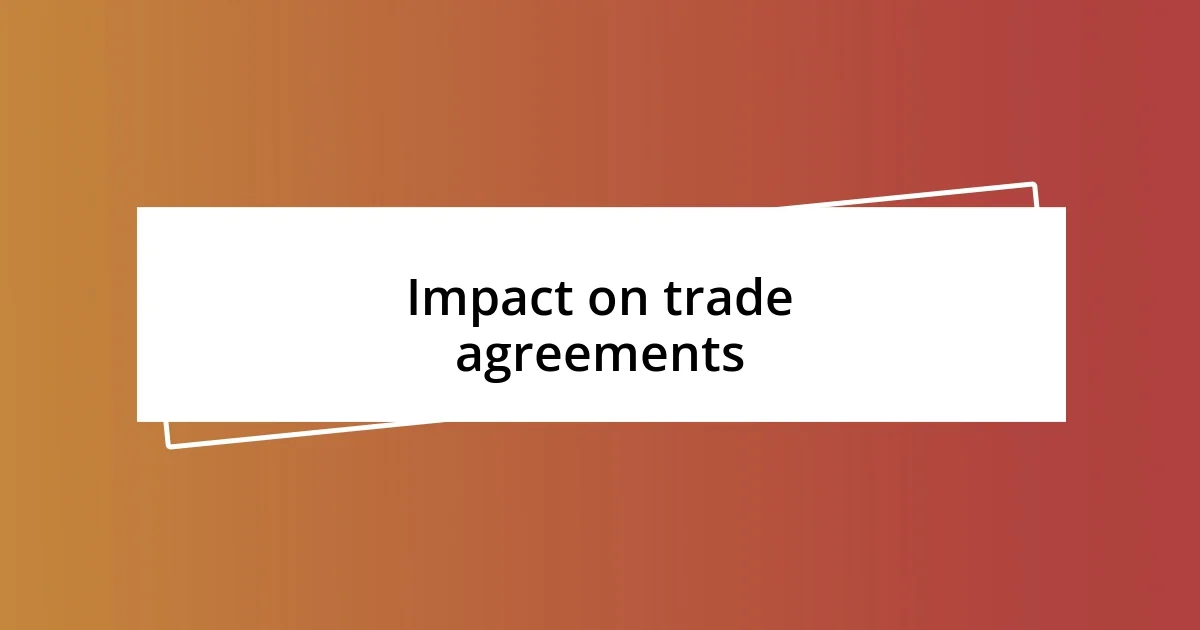
Impact on trade agreements
Adjusting to the new trade agreements after Brexit felt like standing at the edge of a vast and uncharted territory. I can still recall the day I received a notification about the new EU import quotas. My heart sank as I realized that suddenly, some of my go-to products were now subject to restrictions. I couldn’t help but wonder, how many other businesses were caught off guard like I was? It was a stark reminder that the ripple effects of regulatory changes were far-reaching.
Another moment that stands out was when I negotiated with a potential partner in Europe. We both had to quickly familiarize ourselves with the new customs procedures that had arisen. The back-and-forth on compliance often felt tedious and frustrating, leading me to question whether these new hurdles were worth the potential collaboration. Ultimately, I learned that patience and clarity in communication were key; it was essential to ensure both parties understood the implications fully.
As I navigated these new arrangements, I began to see trade agreements less as barriers and more as opportunities for creative problem-solving. One negotiation led to the development of a unique distribution strategy that not only met the new standards but also opened avenues for growth I hadn’t considered before. Isn’t it fascinating how what seems like an obstacle can sometimes be a gateway to innovation? Embracing this mindset has reshaped how I approach my international partnerships post-Brexit.

Adapting to compliance requirements
Adapting to compliance requirements post-Brexit was an eye-opening experience for me. I remember staring at a list of new regulations, wondering how I could possibly implement them all without getting overwhelmed. I quickly found that breaking down the regulations into manageable tasks helped reduce the stress; it allowed me to tackle one requirement at a time rather than feeling buried by an avalanche of new information.
One strategy that really paid off was establishing a dedicated compliance team. It was comforting to have a group of people focused solely on understanding and meeting these requirements. Sharing our insights and frustrations became essential as we navigated this unfamiliar terrain. How often do we underestimate the power of collaboration? It was through open conversations and brainstorming sessions that we uncovered useful resources and advice that I never would have thought to seek on my own.
There were also moments of doubt when the compliance requirements felt insurmountable. I distinctly recall a late-night discussion with a colleague who shared a similar struggle. We realized that acknowledging these feelings was part of the process. Instead of letting the changes bog us down, we challenged each other to view compliance as a journey rather than a barrier, and this shift in mindset allowed us to adapt more smoothly. How has viewing challenges differently changed your approach? For me, it ignited a sense of possibility that I hadn’t felt before.
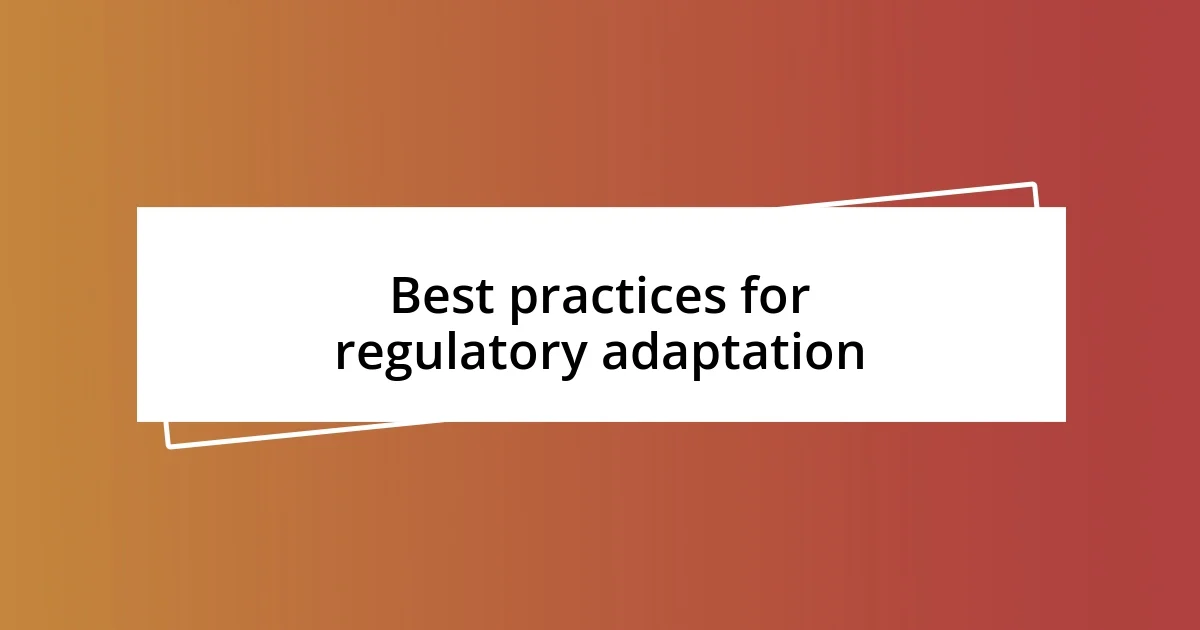
Best practices for regulatory adaptation
When it comes to regulatory adaptation, I’ve found that building a robust support network is invaluable. In my experience, reaching out to industry peers helped me better grasp the nuances of the new regulations. It was during a rather informal coffee chat that I learned of a shared online resource that laid out the changes in a clear, concise manner. Have you ever felt a weight lift when discovering tools just like that? This kind of shared knowledge can be a game-changer.
One practice that stood out for me was conducting regular training sessions. I organized monthly workshops for my team, where we would delve into different aspects of the regulatory landscape. These sessions not only educated us but fostered a sense of team unity. I still remember the spark of excitement when a team member presented a creative solution to a compliance challenge we thought was insurmountable. It’s moments like those that remind me how collaboration can turn obstacles into opportunities.
Another important takeaway has been to embrace flexibility in our approach. I vividly recall the day we had to pivot our strategy due to sudden regulatory announcements. Initially, there was panic—how could we adapt so quickly? But adopting a mindset geared towards agility allowed us to reassess our priorities. In those moments of upheaval, I realized that being open to change is just as crucial as understanding the regulations themselves. How has flexibility played a role in your own experiences? For me, it transformed challenges into stepping stones.
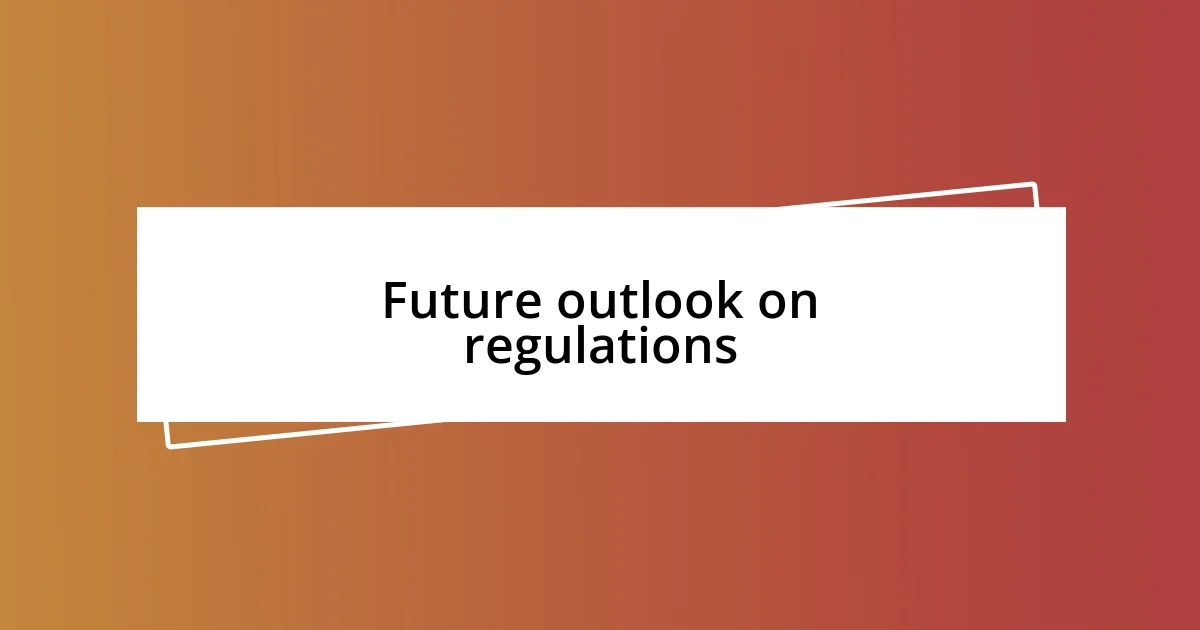
Future outlook on regulations
Looking ahead, I believe the landscape of regulations will continue to evolve, much like how I had to adapt my own strategies post-Brexit. I often find myself wondering how companies will maintain compliance amid shifting political tides. It’s essential to stay informed and proactive; I remember diving into industry forecasts to anticipate potential changes, which allowed me to position my team for success.
Regulations are likely to become more complex, addressing emerging technologies and globalization. I recall a moment when our team had to grapple with new digital compliance requirements. It felt like we were in uncharted waters, but understanding the nuances of these changes empowered us to innovate rather than retreat. What if we viewed these complexities not as hurdles, but as opportunities for growth?
Moreover, there’s a growing emphasis on sustainability and ethical practices in regulatory frameworks. This shift excites me, as I’ve witnessed firsthand how incorporating sustainability into our practices not only meets regulatory demands but also enhances our brand image. Have you considered how aligning with ethical regulations could elevate your business? It’s a win-win situation—a challenge that drives innovation while fostering a sense of responsibility towards the community and environment.














